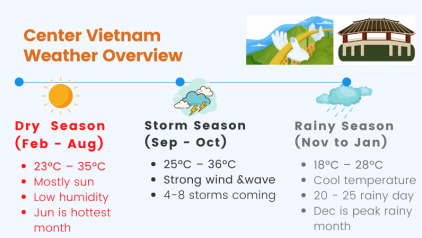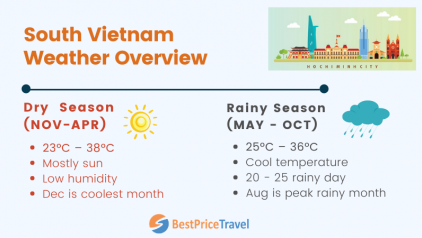North Vietnam Weather: Ultimate Guide
A lot of people know about Vietnam, especially the North by Halong Bay. But the whole area is not only attracted by Halong Bay or Sapa, we have many more things to discover. And if you are planning to visit, the article below will give you some detailed information about the North Vietnam weather in general.
North Vietnam Weather Overview
There are two different Vietnam weather patterns: the Northern one with 4 seasons (spring, summer, autumn, winter) and the Southern one with 2 seasons (dry, rainy). Generally speaking, the Northern weather pattern is similar to weather patterns in most North Hemisphere countries. Northern regions have tropical climates with a bit more distinctive seasonal changes of weather. The weather in the North is divided into 4 different seasons and each season of the year has its own characteristics of the weather that makes the landscape different. Let’s take a look at the features of each season and months of weather in the north below.
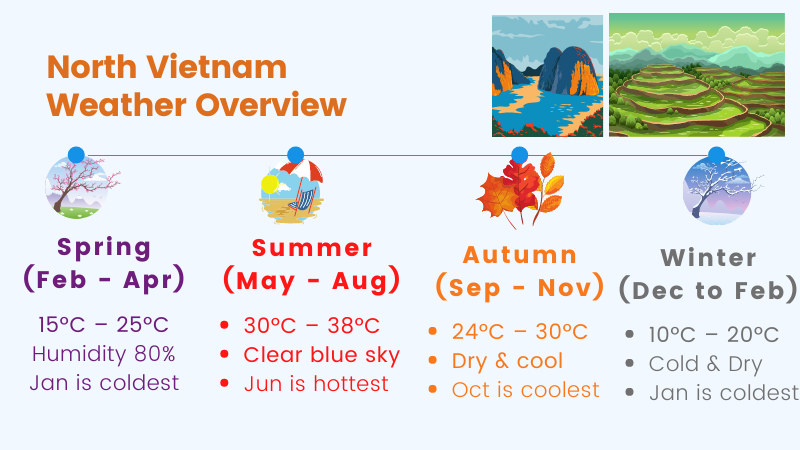
North Vietnam Weather by Seasons
Spring
February to April is the season of spring when the temperature is rising from the cold month of January. With the average temperature in North is at around 15°C - 25°C and the average humidity is at 80%, drizzle and mild humidity should be foretold, but the sunshine is pleasant with clear, blue skies. In spring, small rains are expected, the North weather is still pleasant and great for hiking, with spring flowers in full bloom in different places, from Hanoi city to the upper northern area making the region especially beautiful. It is the best time to visit North Vietnam if you want to capture Instagram-worthy pictures wearing your best outfit. Spring is also the time of almost all festivals in North Vietnam. Traditional festivals, flower villages and magnificent landscapes make for impressive subjects for photos in spring.
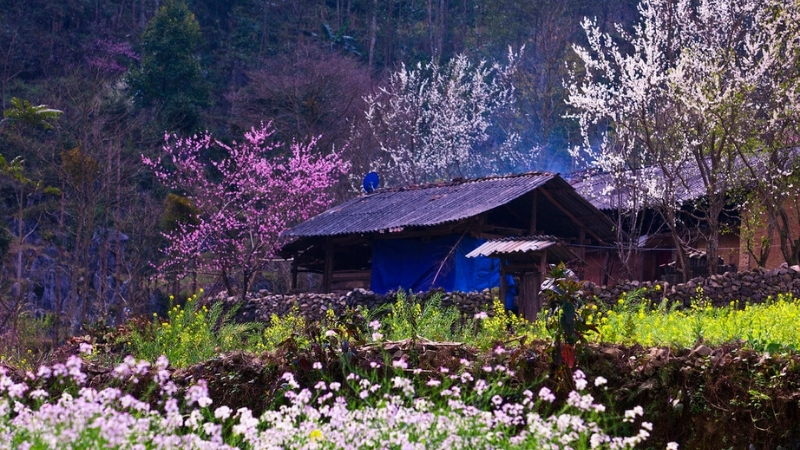
Spring in north Vietnam
Summer
The summer lasts from May to August every year, it is very hot at this time and the normal temperature is around 30°C - 38°C, so that beach vacations are meant for children during this period. Although it is the high season for the domestics who travel by the short time in the summer in Vietnam, the mountainous areas or a lot of historical monuments are not too touristy since summer vacation for Vietnamese families normally means beach trips.
75% humidity on average and the precipitation level between 240mm and 340mm in recent years means you can get caught in the rain no matter what part of the month you plan your visit. Nonetheless, rains come and go quickly, and no matter how torrential they may get. The rain does some good in taking away all the heat and gives you a pleasant evening to hang out. Sometimes, there are some early storms in late August, but it’s really unusual. The storm season normally begins in September so summer is also very ideal for any foreign tourist who books and enjoys the trip to Vietnam.

Kayaking is best activities in north Vietnam summer
Autumn
Autumn in Vietnam is from September to November, the North Vietnam weather experiences the most pleasant time. The weather is cool and dry with a light breeze. It is not unreasonable when autumn is the high tourist season in Vietnam. This period of time gives the most pleasant climate of the year when it features cool but also sunny weather ranging from 24°C - 30°C which makes it perfect for outdoor activities.
Autumn is considered to be the most romantic time in Hanoi when you can enjoy a lot of specialities like green young rice (Cốm), dracontomelon (edible fruit named Sấu), milk flower (Hoa Sua), etc. Likewise, the North highland areas immerse in yellow grain, which offers spectacular scenes to catch sights of the endless yellow rice terraces — something you might have never seen before — and get in touch with ethnic minorities living in villages of Vietnam. In November, the North remains its late autumn climate. Temperatures drop further down to an average of 24°C, and the air becomes colder.
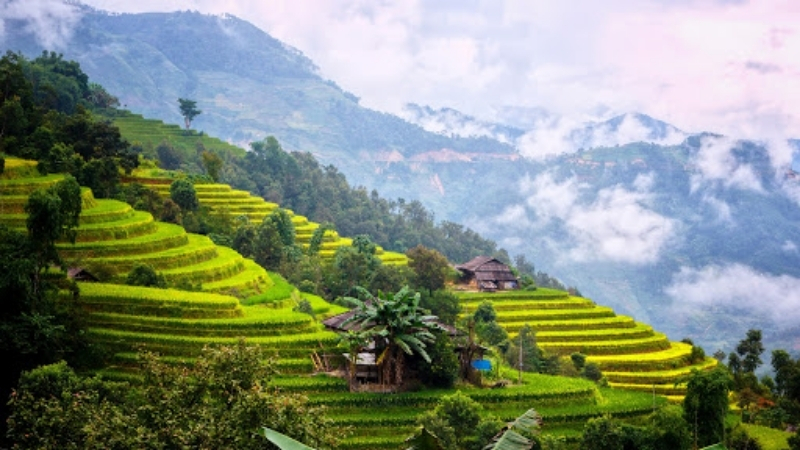
Yellow rice terrace in north Vietnam autumn
Winter
Winter in Northern is from late November to February, the period shows a different cold season, Hanoi and nearby areas (Halong Bay, Ninh Binh, Mai Chau etc.) may drop to below 10°C and it is even more severe in mountainous areas like Sapa, Ha Giang, Mau Son etc., when the temperature may drop below 0°C. Winter is one of the best times to discover North Vietnam. It is not only the time of the dry weather, delicious & hearty dishes but also the time to explore the outstanding sceneries of the beauty of Vietnam.
A hot delicious bowl of Pho or some sour and spicy hot pot will warm you up on Hanoi cold winter days, make every moment more memorable. Winter is also a good time to take a trekking trip to the mountainous areas of the North. The fog creates an aura of mystery that also lends credence to the Northwest mountain’s reputation as Heaven’s Resort.
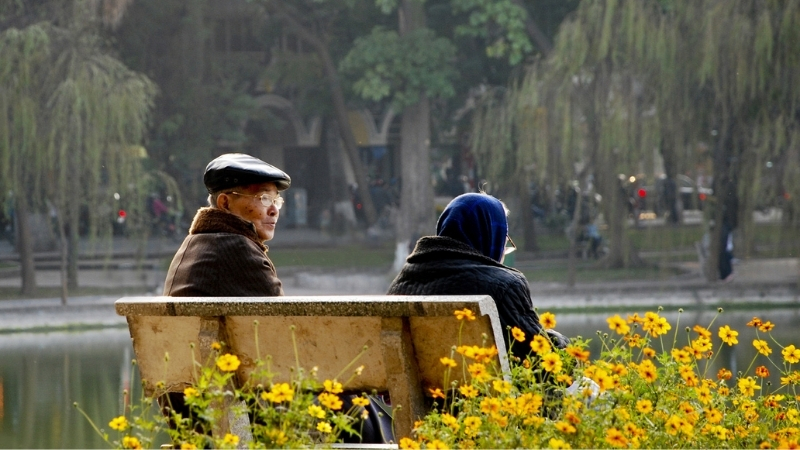
Winter in north Vietnam
North Vietnam Weather by Months
January: is one of the driest months of the year in North. You can get plenty of sunshine and clear blue skies. Temperatures in the north are still quite cool. The average temperature is 18°C. Rainfall is at the lowest level. At this time, haze is not unusual, especially in coastal areas and around Ha Long Bay. In the North Pole, conditions are dry but chilly and sometimes foggy, especially at night.
February: the temperature of the Northern area is still quite cold at around 20-22℃, it might decrease to 14℃ at night. Famous beaches in the North are unavailable for swimming during this time because of the cold bites. Though the temperature has already risen in comparison with January, in Sapa and other mountainous areas, it is still lower than the average, so you should prepare warm layers of clothes for the colder evenings here.
March: temperature is between 16°C - 26°C with very low rainfall but an excess of humidity. If you live in Hanoi long enough, you will get used to the idea of sweating walls and floors. This unfortunately does not give the most pleasant feel to locals and visitors alike. At the same time, expect drizzle and mist for most days in March, which sometimes may obscure your view of the mountain and sea.
April: temperature rises continuously because the region heads towards the hot and wet summer months. The average temperature is about 24°C, but it will be hotter in Hanoi. Visiting the North mountainous rural area in the is a good idea to escape from the bustling and busy Vietnam cities. The sheer rice terraces sculpted by ethnic minorities are so picturesque and wonderful that you never want to miss during your trip to Vietnam in April. Admiring the beauty of the unique rice terraces while enjoying the peaceful environment.
May: bids goodbye to the humid and misty month of April. The weather in North Vietnam is hot but comfortable. The temperature in Hanoi ranges between 24°C and 32°C and a balmy humidity of 75%. With lots of sunshine without the scorching heat, May is the best time to visit Hanoi and its famous surrounding destinations such as Halong Bay, Lan Ha Bay, Ninh Binh and so forth.
June: one of the few times in the year that the weather in North and the Central region share a common pattern. Hanoi and Halong Bay’s temperature in June stays between 27°C - 36°C and scanty precipitation. There may be sudden downpours, though the chances are not as high as in July and August.
July: is both the hottest and rainiest month in the North of Vietnam. If you stay in this region long enough from June to July, you can see a pronounced rise in both the heat and the rainfall level. The average temperature in Hanoi is between 26°C and 33°C but it normally feels like 40 to 40 plus for most of the days, except for when the downpours take over.
August: The tropical climate of Vietnam can clearly be felt via the summer in the Northern region. August is the last month of summer in the North with an average temperature of 29°C. You can expect this number to range widely from 26 up to 36°C. Although it is not the hottest time, August may have storms or heavy rains which might affect your cruise trip in Halong bay or hiking trip on the mountain due to the wet soil.
September: The miserable downpours in the previous month at least do some good by cooling off the heat for September. Hanoi’s temperature is down to 24°C - 31°C low/high, but the humidity remains high at 80%. Northern mountain shares similar humidity but a lower average at 17°C - 27°C both locals and foreign travellers have voted for September as the favourite month of the year. That’s because it is not too hot or not too cold, the general weather in North Vietnam is dry and comfortable.
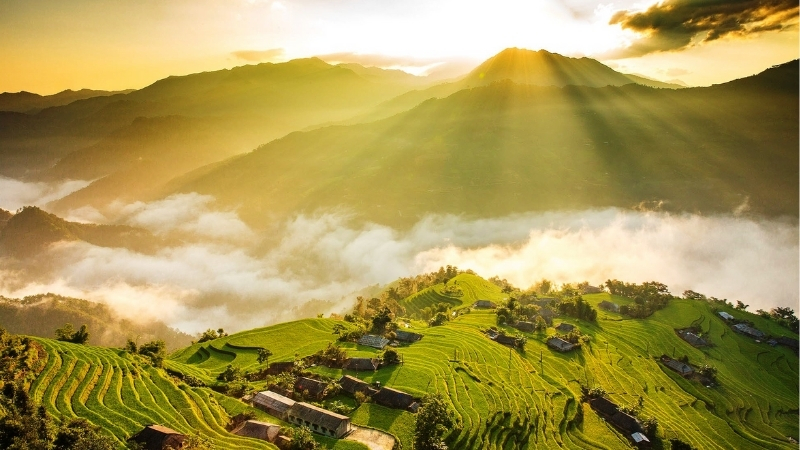
Sep is best time to see golden rice
October: the weather is cool, chilly with a little drizzle. The average temperature ranges from 23 degree Celsius to 26 degree Celsius with a pleasant atmosphere. In remote areas such as Sapa, Mu Cang Chai and Ha Giang, the weather is dry and sunny which is perfect for some soft adventure activities such as trekking. Additionally, October is a superb time to visit Halong Bay, Ninh Binh.
November: a transitional period between the fall shoulder season and cold winter. The weather is characterized by dryness and coolness. The temperatures remain mild at around 24°C so you do not need to pack many thick clothes. Lower precipitation also makes the average humidity decrease to about 74%. The 7 hours of sunshine on average is enough for one to appreciate the beauty of the changing season. Little rainfall in the Sapa, Ha Giang, Yen Bai, and other mountainous provinces is also a perfect condition for trekking or cruising experiences.
December: endure a chilly winter with highs of 21°C and lows of 15°C Temperature drops sharply as you move further up north or to the mountain region in the Northwest and Northeast areas. There are a few days during the cold wave when the temperature gets to sub-zero with frost and snow inevitable. This is also the driest month of the year in the North with very little rain and low humidity level, at 68%. Be prepared for flaky skin and chapped lips, and avoid them by applying frequent moisturizers and drinking plenty of water.
In a nutshell, any time you visit North Vietnam, the region has its own beauty that can surprise you. No matter what season, or which month you come, the weather is still pleasant. From the mountain to the ocean, the sceneries have big changes allured visitors. The only thing you need to mind is to check the weather and pack the suitable stuff, our North Vietnam’s Tours thing will satisfy you.
You might also want to know about Center Vietnam Weather.
Hue Pham
Image source: Internet







